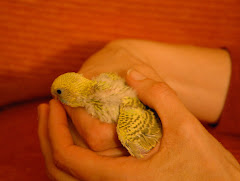
It is clear to me that the budgies have meaningful vocalizations. Once, when the budgies were singing, I told a friend over the phone that they were sounding so joyous. His reply was that a friend had told him, that budgies make noise when stressed or upset. I thought about it, and realized, both were true. The budgies have a specific noise when eating greens, mostly, Sutcliffe to Boo and vice versa, that I think means “here is food” or a specific type of food. They also have a certain squawking, that is associated with running rapidly back and forth on the perch, and sometimes, flapping the wings. I believe this is territorial. And they have several other vocalizations that they make regarding being picked up, fed, romantic.
Perhaps the most famous budgie, Sparkie Williams, could speak 550 words and also recite nursery rhymes-the
BBC has archived some of his speech. Another Bird, Alex, was taught to name a number of objects and colors. He also was taught the word “no” which he used often, to try to avoid being picked up, and also, being asked to perform.
Trainer: Alex, what's this?
Parrot: No!
Trainer: Yes, what is this?
Parrot: Four-corner wood (indistinct).
Trainer: Four, say better .
Parrot: No.
Trainer: Yes!
Parrot: Three. ..paper.
Trainer: Alex, "four", say "four".
Parrot: No!
Trainer: Come on!
Parrot: No! Trainer: Alex!
Parrot: Paper .
Trainer: Alex, what's this? Come on.
Parrot: No.
Trainer: You can do it, come on!
Parrot: No!
Trainer: Yes!
Parrot: Paper.
Trainer:
What is this?
Parrot: Four-corner ...paper .
My budgies will probably never learn to talk for two (and maybe more) reasons. Firstly, they have each other to talk to, in their mother tongue, and have no need to learn mine. Secondly, I don't put the time into training them. Perhaps another reason is, that if they learned the word, no", it would become even more hopeless.
Although humans (and probably, Neanderthals) are the only known primates with spoken language, there is some genetic basic for language shared by birds and people. Researchers at Duke and Max Plank Institute including Sebastian Heaesler and Kazurhiro Wada discovered a gene, FaxP2, that when abnormal, causes language deficit in humans. This gene is not found in any other mammal, but is found to be important in the vocal learning of birds.
I think you might enjoy the
youtube video of Einstein, the parrot. He is a brilliant speaker, in fact, a “superstar”!






















